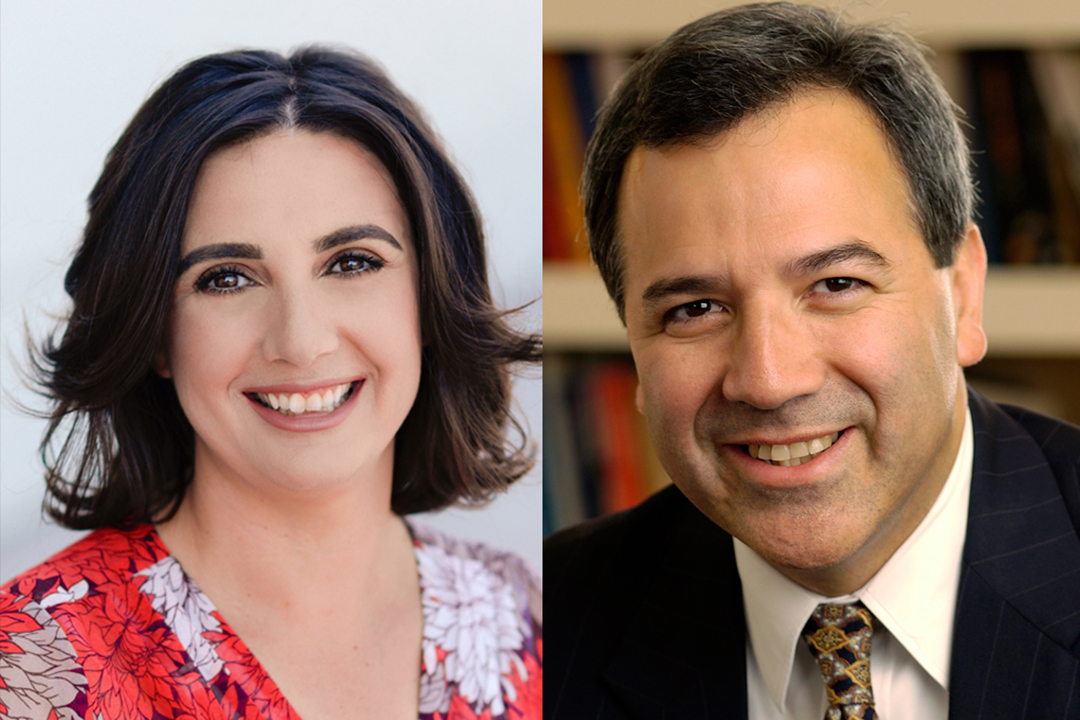Elizabeth Vaquera, noted educator and scholar of Latino immigration and ethnicity, has been named director of the GW Cisneros Hispanic Leadership Institute, which was established in 2015 through a multi-million-dollar gift from GW alumnus Gilbert Cisneros, BA '94, and his wife, Jacki Cisneros, to cultivate diversity in learning and foster leadership opportunities. Also appointed to help lead the new institute is Louis Caldera, former University of New Mexico president and Secretary of the Army. He will serve as the institute’s senior fellow, involved in teaching and research, as well as making strategic connections with community, philanthropic, government and non-governmental organizations.
“We are thrilled by the appointment of these leading figures to advance the important work of the Cisneros Institute” said Ben Vinson, dean of GW’s Columbian College of Arts and Sciences. “Both bring to their roles exemplary records of scholarship, mentorship and public service, as well as first-hand knowledge of the challenges facing first-generation immigrants.”
Vaquera, who received her doctorate in sociology from the University of Pennsylvania, is particularly cognizant of those challenges through her own experiences as a young girl and as the first in her family to graduate from college. “While I hold a PhD from a prestigious Ivy League institution, I am also an immigrant for whom English is her second language and who was raised by a poor single mom,” Vaquera noted. “A professor who mentored me through college changed my life, and I am committed to continuing to pay it forward and reducing inequalities through education by helping Hispanic youth succeed and become leaders in their chosen careers.”
Caldera, whose family immigrated to the United States from Mexico, is similarly dedicated to drawing from his own personal and professional experience to advance the institute’s mission of leadership development and academic support. “Over the course of my education and ensuing public service career, I have worked toward bringing others along and strengthening the capacities of various institutions to broaden Hispanic participation in meaningful and lasting ways,” Caldera said. “At the institute, I look forward to doing what I can to cultivate a new generation of students and leaders who will be among those shaping the social, political and economic landscape of our country in the coming years.”
The Cisneros Institute’s mission is focused on helping students gain the leadership skills and confidence needed to apply to, attend and graduate from a selective university. It encompasses scholarship and mentorship support for select GW students (Cisneros Scholars) who demonstrate a commitment to leadership and community service and who have aspirations to give back to the Hispanic community. In addition, the institute provides opportunities for students, faculty and fellows to conduct and publish research on policy issues facing the Hispanic community.
The institute is also home to the Caminos al Futuro Pre-College Summer Program for academically talented rising high school seniors who are involved in leadership and service activities. The annual program, which launched this month, integrates an on-campus cross-disciplinary educational experience with opportunities to interact with community and international leaders, engage in service-learning activities and meet with lawmakers on Capitol Hill and elsewhere.
“Caminos al Futuro is meant to immerse young people in an experience that equips them with the tools needed to follow their passion and become their generation’s new leaders,” Vinson said. “This program—indeed, the work of the entire institute—has the capacity to change lives.”
Vaquera comes to GW from the University of South Florida where she was a tenured associate professor of sociology. Her research focuses on the wellbeing of vulnerable and diverse groups, and the character and importance of race and ethnic identity in outcomes such as education, health and emotional and social wellbeing. Beyond her research being published in leading peer-reviewed journals, she has co-authored several books, the most recent of which, Education and Immigration, examines the educational experiences of immigrants and their children living in the United States. Vaquera is the recipient of several federal grants by the National Science Foundation and the National Institutes of Health. As the Cisneros Institute’s new director, she succeeds Daniel Martinez who led the institute on an interim basis during its inaugural year and will remain as its associate director.
Caldera, a West Point graduate who holds law and business degrees from Harvard University, brings to GW experience that includes higher education teaching and administration from both the California State University System and the University of New Mexico, where he served as president and professor of law. He also has extensive public sector expertise in elected and appointed positions through his service as a California legislator and as Secretary of the Army in the Clinton administration, and as an assistant to the president and director of the White House Military Office in the Obama administration. His accolades include receiving the American Heritage Award from the American Immigration Council and the Distinguished Civilian Service Award from the Department of Defense.


